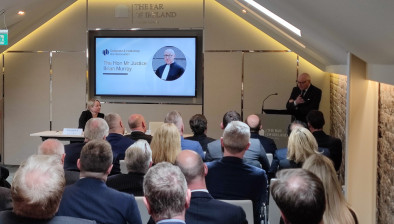Supreme Court judge says online courts will come to Ireland faster than many believe

Pictured: Mr Justice Brian Murray speaking yesterday at the launch of the Corporate and Insolvency Bar Association
Lawyers must brace themselves for the advent of online courts where civil disputes are resolved “from desk to desk” without a traditional hearing in which all parties are simultaneously present, a Supreme Court judge has said.
Addressing a packed room at the launch of the Corporate and Insolvency Bar Association (CIBA) yesterday, Mr Justice Brian Murray highlighted the direction of travel in England and Wales and said: “Don’t be a constituency that will say, as barristers hope to do, that none of this will fly — or at least, that none of it will fly here.”
He urged attendees to read Professor Richard Susskind’s Online Courts and the Future of Justice, which he said “sounded fantastical” at the time of its publication in 2019 with its prediction of “a system of justice in which the preponderance of pleading, submission and the determination of at least smaller and uncomplicated cases will be conducted more or less entirely online”.
However, judicial authorities in England and Wales “have run with that concept and have done so, partly as a result of the pandemic, at a speed that could never have been predicted when the book was written only three years ago”, Mr Justice Murray said.
Recently enacted provisions of the Judicial Review and Courts Act 2022 have established an online procedure rules committee (OPRC) which is now developing a new system of digital justice in England and Wales, he pointed out.
The judge continued: “There are constitutional and indeed cultural reasons why none of this may take off in Ireland. However, if it works in the UK — and fortunately, or unfortunately for us, our neighbouring jurisdiction is far ahead of the rest of the world on this — the pressure from consumers of the justice system, and in particular from business and the state, to produce something similar here would be immense.
“We need, at the very least, to start thinking about how exactly advanced technology — and by that, I mean smart systems that actually manage and advance cases — can be most effectively operated in a way that reduces the cost of litigation while at the same time maintaining our fundamental values of open justice within an adversarial system.”
He added: “Susskind believes that the generation that conducts so much of its working, social and commercial life online will expect that they can obtain justice through similar transactions. That is the view that has driven much of what is happening now in the UK.
“That generation may be far less concerned about the advantages of the public administration of justice, or have the same attachment to the old way of doing things as their parents may have. But these are people who will ultimately dictate the shape of our justice system in the years to come.”
The latest specialist bar association to be launched by The Bar of Ireland, CIBA was established in February to promote the expertise of members in the area of corporate and insolvency law. Chaired by Kelley Smith SC, it will host a number of CPD events and its inaugural conference within the coming months.










